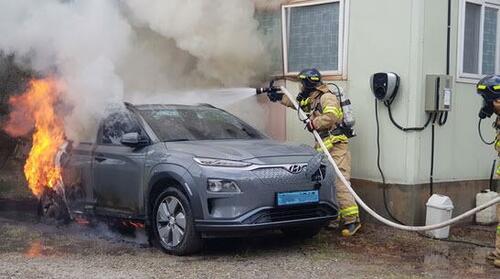
South Korea’s electric vehicle (EV) sales fell by 0.1% last year, the first annual decline since 2017, as drivers cite fears of batteries catching fire and an insufficient number of chargers as key obstacles alongside higher interest rates and high prices.
South Korean drivers are concerned that their future EVs could catch fire while charging or in a car crash, according to a November survey by the Korea Transportation Safety Authority quoted by Bloomberg on Monday.
In 2020 and 2021, several high-profile cases of EVs catching fire were reported in South Korea. Three years ago, an electric bus manufactured by Hyundai Motor caught fire while in use.
A few months earlier, Hyundai Motor recalled more than 77,000 Kona EVs sold globally after 13 of the electric crossover vehicles caught fire. Hyundai and its battery supplier, LG Chem, were at odds over the reasons for the recall, with the battery cell maker saying it wasn’t its battery that was the culprit.
Another key reason for lower EV sales and increased hesitancy among South Korean drivers to switch to zero-emission vehicles has been a lack of charging points.
Concerns about vehicles catching fire while charging in closed-space underground parking lots of high-rise apartment buildings have deterred Koreans from considering switching from a gasoline-fueled car to an EV.
So EV sales declined by 0.1% to 157,823 units in 2023, the first drop in six years, per data from the Korea Automobile Manufacturers Association (KAMA) cited by Bloomberg.
The relatively higher prices of EVs compared to conventional passenger cars and the rising interest rates have also contributed to the decline.
Globally, price affordability, anxiety over battery range, a lack of a widespread network of charging points, and higher insurance costs are the key reasons for consumers to think twice before buying an electric vehicle.
In November, a group of U.S. car dealers warned the Biden Administration that most U.S. car buyers aren’t interested in purchasing EVs, incentives or not.




